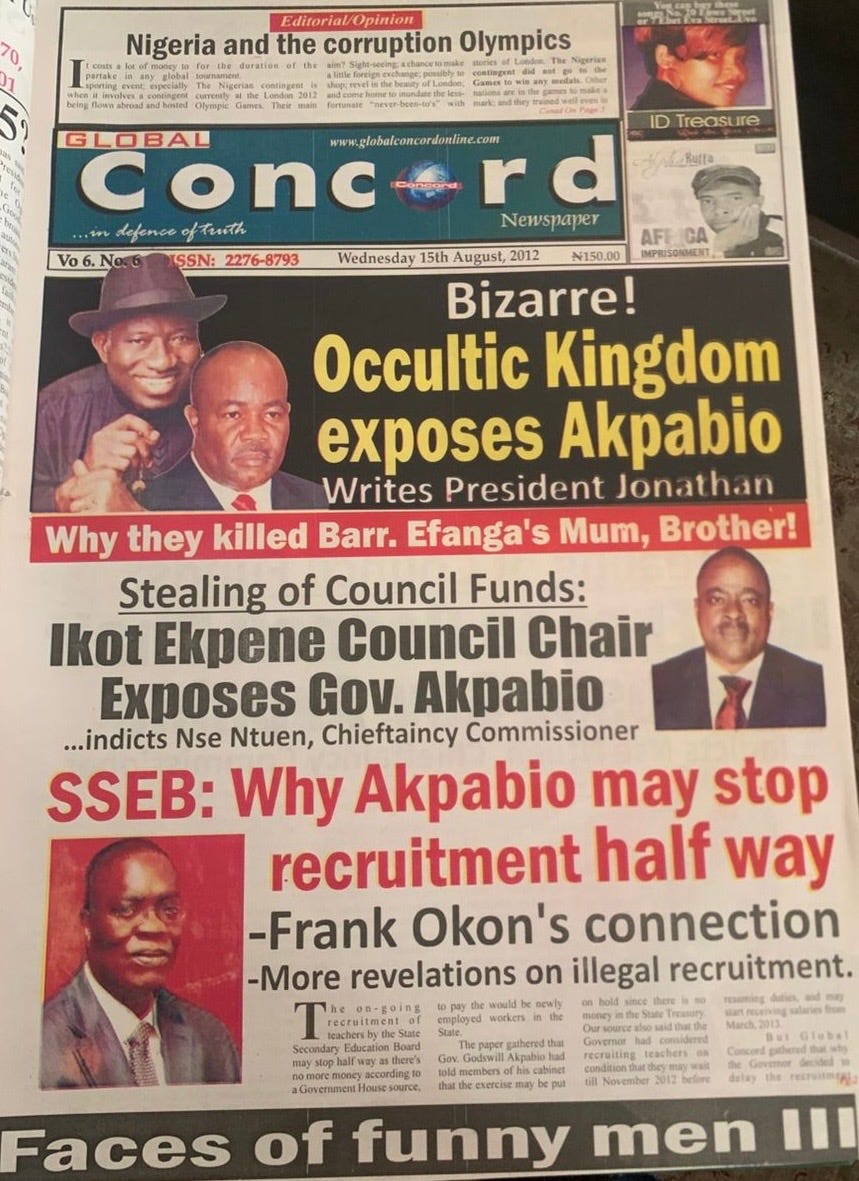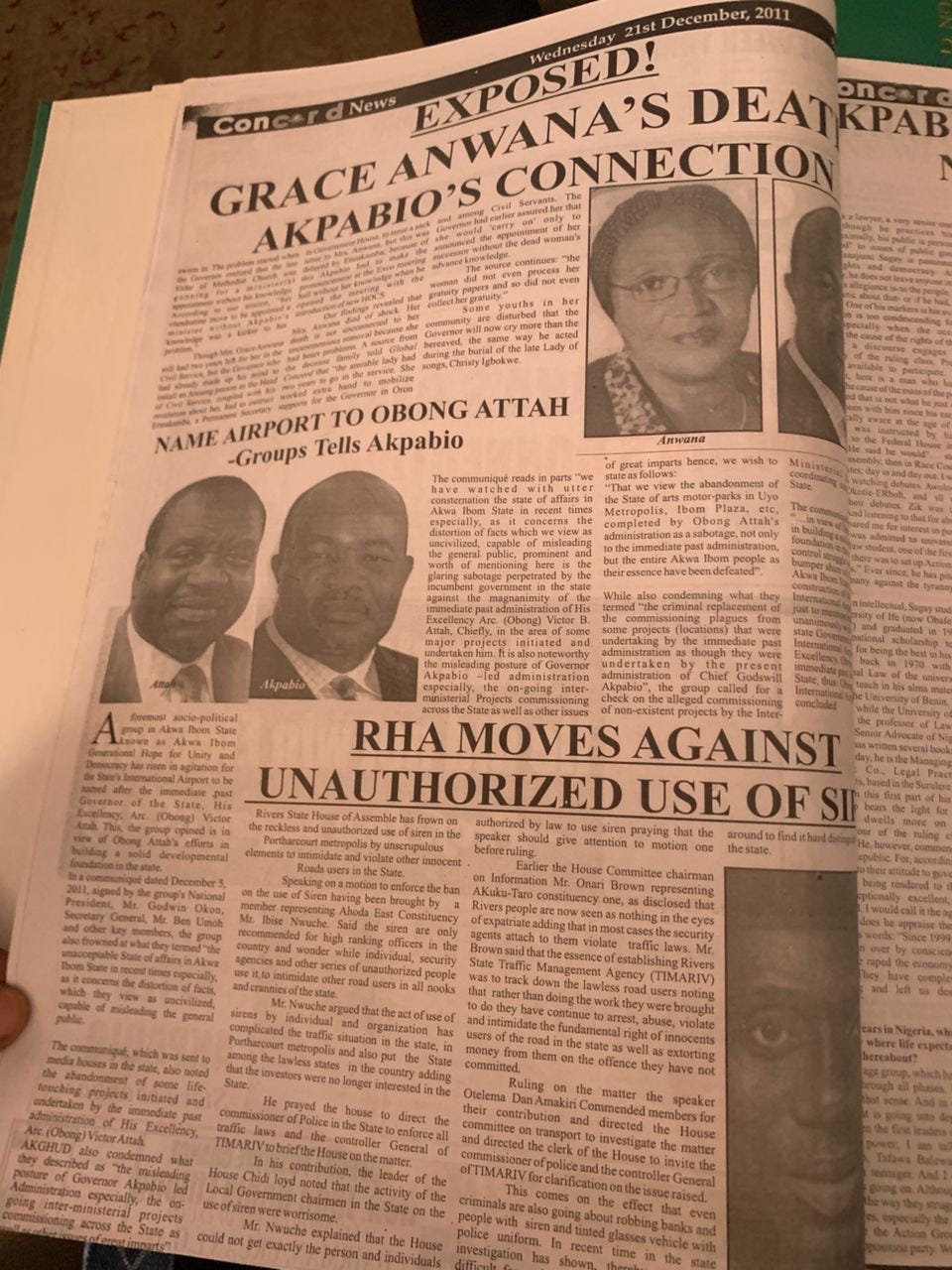GODSWILL AKPABIO AND A NATION HELD HOSTAGE: WHO WILL BELL THE SENATE PRESIDENT?
The questions surrounding Godswill Akpabio, from Prof. Itse Sagay's corruption alarms, unanswered death trails and the suspension of Senator Natasha. Has the Red Chamber fallen into the wrong hands?
In the soft soil of Akwa Ibom’s political landscape lies a trail of forgotten bodies, abandoned truths and buried confessions. The tale is not one for the faint hearted, for it tells of a time when the air in the state was thick not only with humidity but with fear. Between 2011 and 2012, under the administration of Godswill Akpabio as Governor, a host of politically controversial events shook the state to its core. Names such as Grace Anwana, Barr. Francis Efanga, his mother and brother were not just casualties of coincidence, they became symbols of a decaying republic where the machinery of power moved not with justice but with vengeance. While history was being made elsewhere, history in Akwa Ibom was being erased with chilling precision. Today, some of those who were at the centre of these events occupy more powerful positions in the country. They now hold the gavel of the Nigerian Senate and speak as national custodians of law, yet their past remains steeped in silence.
The death of Grace Anwana, a senior civil servant in Akwa Ibom State, remains one of the most disturbing in the catalogue of unresolved tragedies. Her demise was not treated as the passing of a citizen who had dedicated her life to public service; it was discarded like an inconvenient page in a file nobody wanted to read. The reports at the time suggested a sinister undertone, with fingers pointed towards the seat of power itself. Words in the corridors of Uyo alleged that her fate may have been sealed by her refusal to bend to unlawful pressures. The government’s response was a familiar one: silence, a carefully orchestrated silence. If Grace had died of natural causes, surely her death would have earned the decency of an honest investigation, but when government turns its eyes away from the dead, one must ask whether the cause of death was a man or a system.
No less unsettling was the murder of Barrister Francis Efanga’s mother and brother. These killings did not take place in the thick of armed robbery or banditry. They took place in the heart of political competition. They happened at a time when voices challenging the status quo were being systemically quieted. The family of Barr. Efanga became a symbol of political cleansing, where blood became the ink used to redraw the boundaries of influence in the state. He was a member of the opposition ACN, and had dared to raise his voice against a dominant political structure. In return, he was given sorrow. His mother and brother were murdered in their home in Mbikapan Atan village, and to this day, no conviction, no arrests, and no closure, except for shadows and silence. This is not the tragedy of a man, but the tragedy of a state that taught its citizens that political ambition comes with a Blood Tax.
The Akwa Ibom Broadcasting Corporation (AKBC), an institution meant to be the voice of the people, was reduced to a parody of itself under that same administration. While journalists were harassed and ethical standards plummeted, the Director-General was reported to have commandeered government vehicles and supervised an agency with only two working cameras. An institution with a multimillion naira budget was starved of tools, but not of patronage. The message was clear: propaganda needed no equipment, except for only obedience. In a country where media houses are already under pressure, what happened at AKBC under that regime was not mismanagement. It was a deliberate ploy to ensure the people only heard what power wanted them to hear.
It is impossible to ignore the broader climate in which these events took place. The civil service under that government was turned into a minefield. Promotions became favours, employment became political inheritance. There were revelations about illegal recruitment within the State Secondary Education Board (SSEB), with accusations suggesting that loyalty to political godfathers was the real requirement for being considered for a job. Merit was the first casualty, competence the second. The public outcry was met with the usual smokescreens of committees and denials. In truth, what Akwa Ibom witnessed was the erection of a parallel civil service, one where the true curriculum vitae was not your education or experience, but your allegiance.
Beyond the brutality of the events is the irony of the present. The same man under whose watch these events took place now presides over the Nigerian Senate. Today, he delivers speeches on justice, holds national prayers for unity, and speaks on the rule of law. Nigeria, however, is not suffering from forgetfulness, it is suffering from selective memory. It is not enough to say a man has not been convicted. The real question is: has the country even dared to try? When Occultic Kingdom wrote President Goodluck Jonathan pleading for intervention, they were not merely complaining; they were confessing a helplessness only found in those who have been made to be slaves for too long. Their cries, like many others, were filed under irrelevance.
It is within this troubling atmosphere that one must reflect deeply on the ordeal of Senator Natasha Akpoti-Uduaghan, a sitting female lawmaker whose dignity is been dragged through the mud in a way that should concern all Nigerians. She accused the very man who now sits as Senate President, the same man under whose watch so many questions remain unanswered in Akwa Ibom, of sexual harassment. An allegation that should have triggered a thorough, independent investigation in any decent democracy. Instead, she was hurriedly and unconstitutionally suspended from the Nigerian Senate, barely 24 hours after raising the alarm. Her security details were withdrawn. Her privileges as a Senator were stripped with audacious impunity. Left vulnerable, she publicly cried out, alleging an assassination attempt on her life; a claim that was not frivolously made but consistent with a pattern too familiar in our political scene. Rather than seek redress through civil litigation which would have accorded him the full moral standing of a wrongly accused statesman, the Senator Godswill Akpabio allowed state machinery to turn its gaze upon her, plying institutional force in place of legal decency. The message, however, was clear: that in Nigeria, the cost of courage for a woman is often higher than the cost of criminal silence. Yet, when power is used not for service but for vengeance, history rarely forgets. If Senator Natasha’s cries are left unanswered, if her safety and dignity are sacrificed on the altar of political superiority, then the nation should prepare for the bitter harvest of injustice sown so brazenly in the full glare of its people.
The gravest danger facing Nigeria today is not just bad leadership; it is institutional cowardice. We have reached a stage where the system protects power, not people. The media, once a bastion of truth, is gagged either by fear or favour. Civil society oscillates between activism and survival. Even the opposition chooses strategic silence, calculating political gains over justice. When a nation begins to lose its moral compass in the face of calculated tyranny, it slides into anarchy wrapped in bureaucracy. The names of those who died are more than statistics; they remind us of what we have allowed power to become.
This is not an attack on a man, but an interrogation of a system. One that continues to reward silence, protect impunity and convert unresolved trauma into political capital. Nigeria cannot move forward if the ghosts of its past are still taking roll call in the National Assembly. If truth is to matter in this country, then the people must remember, and remembering comes with a responsibility. What happened in Akwa Ibom must not remain the province of dusty archives. If we do not speak, then silence becomes policy, and when silence becomes policy, death becomes government.
By ILUO DePOET
Lawyer | Poet | Speaker | PanAfrican |
A voice from the soil, not the throne.







